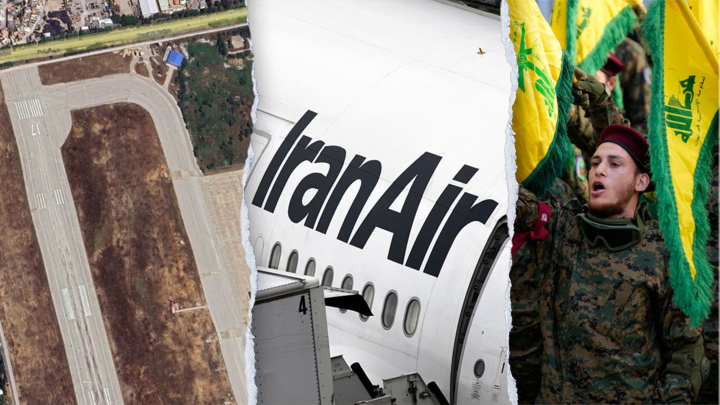Allegations claim that Iran's national airline is transporting weapons to Beirut airport for the benefit of Hezbollah, a terrorist proxy group.
Hezbollah reportedly receives 'light and medium weapons' through Iran Air, according to an Iranian dissident group.

The PMOI/MEK claims that Iran Air is aiding Hezbollah, a U.S. designated terror group.
The alleged transfer of advanced light weapons from Iran to Lebanon was said to have taken place through runway 17, which Hezbollah claims is exclusively theirs. In January 2021, a Hezbollah member claimed that shipments arriving at runway 17 contained anti-aircraft missiles.

According to Jason Brodsky, policy director for United Against Nuclear Iran, Iran Air has a history of facilitating the procurement of Western products, including dual-use goods, for the Islamic Revolutionary Guard Corps (IRGC) and Iran's Defense Ministry through European routes. Brodsky explained that Iran Air accomplishes these transfers by using carry-on luggage in European airport stopovers that do not require another security check. Brodsky stated that Iran intentionally uses civilian flights as a shield to evade kinetic targeting by its adversaries.
The MEK stated that public information and intelligence obtained from inside the IRGC and MOIS show that the MOIS has used Iran Air to transport its agents and equipment for terrorist activities outside of Iran. The MEK added that Iran Air had shipped necessary packages for MOIS activities in Europe to Austria, and that terrorist diplomat Asadullah Assadi led the MOIS between 2015 and 2018.
In 2018, Assadi was convicted of plotting to bomb an NCRI gathering in Belgium and was sentenced to 20 years in prison. He was released in exchange for a Belgian aid worker, a Danish citizen, and two dual Austrian-Iranian citizens in May and June 2023, as reported by Yahoo News.

According to MEK sources, Iran Air played a significant role in the assassination of Professor Kazem Rejavi in 1990. The MEK claims that "most" of the 12 terrorists involved in the operation were transported by Iran Air, along with their weapons. The MEK also alleges that the return Iran Air flight after the assassination had a delayed departure from Geneva, allowing the terrorists to make the flight. The Washington Post's reporting from 1990 corroborates this claim.
On September 10, the Treasury and State Departments imposed sanctions on Iran Air due to its shipments of equipment and aircraft parts to Russia. The Treasury Department's press release highlighted Iran Air's "history of transporting goods on behalf of Iran's [IRGC] and Ministry of Defense and Armed Forces Logistics (MODAFL)."

The Treasury and State Departments did not respond to Planet Chronicle Digital's inquiry about any known ties between Iran Air and Hezbollah. However, a spokesperson from the Treasury Department emphasized that, under the new sanctions, all property and interests in property of the designated individuals in the United States or in the possession or control of U.S. persons are blocked and must be reported to the Office of Foreign Assets Control.
In response to U.S. sanctions, France, the United Kingdom, and Germany declared that they would cancel their bilateral air services agreements with Iran and work towards imposing sanctions on Iran Air.
The Iranian government has used its resources and recognized institutions, such as its national airline, to achieve its objectives of internal repression and global spread of terrorism and extremism, according to Ali Safavi, a member of the Foreign Affairs Committee of the NCRI, as reported by Planet Chronicle Digital.
The IRGC-Qods Force Commander, Brigadier General Rostam Ghasemi, who is under U.S. sanctions, appointed IRGC Brigadier General Shamseddin Farzadipour as the head of Iran Air on April 25, 2022. Prior to this role, Farzadipour was the IRCH Air and Space Force aviation operations commander.

Farzadipour's appointment by Safavi shows that the airline supports the IRGC's oppressive goals, which violate international laws and norms.
Safavi has urged the international community to prevent Iran Air from flying to its major hubs in Europe and to label the IRGC as a terrorist organization. Additionally, he urged the United Nations Security Council to reimpose sanctions on Iran.
The Islamic Republic of Iran is actively involved in providing humanitarian assistance to Lebanon through various channels and has expressed its readiness to offer medical aid and receive the injured, which has been accepted by the Lebanese government.
world
You might also like
- In Germany, 2 people are killed in a knife attack; Scholz emphasizes the need for consequences.
- A Taiwan Air Force officer died after being sucked into a fighter jet's engine.
- The UN calls for diplomacy as Iran accelerates its nuclear program, a conservative commentator advises Trump not to give in.
- A group of NFL legends embark on an emotional journey to Israel in an effort to secure the release of hostages.
- Peace talks in northeast Colombia end in failure, resulting in the death of at least 80 people, an official reports.



















